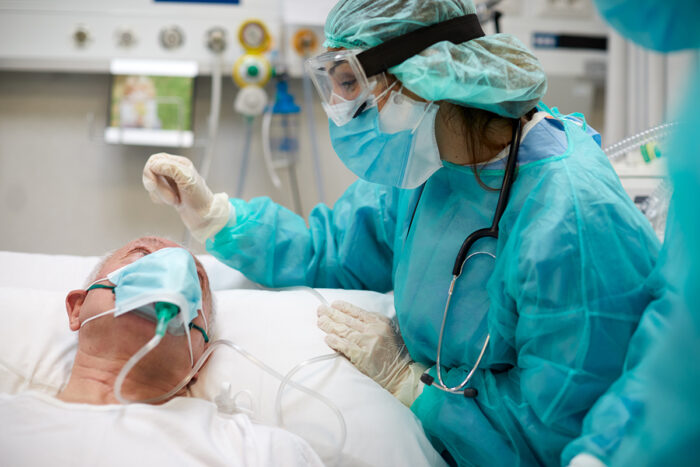$6.2 million grant to fund Center for Perioperative Mental Health
Researchers to study ways to improve mental health for surgery patients
 Getty Images
Getty ImagesClinicians and researchers at Washington University School of Medicine in St. Louis have received a four-year, $6.2 million grant from the National Institute of Mental Health to launch a center designed to help improve mental health in surgery patients, particularly older surgery patients. The center will conduct studies to identify and treat depression and anxiety in surgical patients.
The average person will undergo nine surgical procedures in his or her lifetime, and the periods before, during and after surgery are considered high risk regarding mental health, particularly among older adults. Depression and anxiety are especially common in older surgery patients; past research has demonstrated that about 40% of older surgical patients have mental health difficulties that can affect their quality of life and hinder recovery after an operation.
Identifying and treating depression and anxiety in surgical patients is the goal of a team of clinicians and researchers at Washington University School of Medicine in St. Louis. The team has received a four-year, $6.2 million grant from the National Institute of Mental Health of the National Institutes of Health (NIH) to launch a center designed to help improve mental health in surgery patients.
The new Center for Perioperative Mental Health is the first NIH-funded center of its kind in the United States. The center will conduct clinical trials, initially involving three types of surgery: joint replacement, and cardiac and cancer surgery. Led by scientists from psychiatry, anesthesiology, general surgery, orthopedic surgery and the university’s Institute for Informatics, the center’s purpose is to protect and improve the mental health of patients during the stressful spans just before, during and after an operation, with a particular focus on older adults.
“More older adults are having surgery than ever before, and the rates of clinically significant depression and anxiety are about four times higher among those having surgery than among older adults who are not,” said Eric J. Lenze, MD, the Wallace and Lucille K. Renard Professor of Psychiatry and one of the center’s co-principal investigators. “This new center is designed to allow clinicians and scientists to collaborate to prevent adverse mental health outcomes in older people who need surgery.”
Every year, some 50 million people in the United States — and 350 million worldwide — have surgery. Those operations can be life-changing events.
Older surgery patients in particular face challenging hospital stays, often followed by stints in rehabilitation facilities and then home visits from nurses and therapists. Lenze said the upheaval caused by an operation, frequent changes in location after surgery, and interactions involving medications can contribute to cognitive decline, confusion and issues with a patient’s mood.
The whole process can be overwhelming for patients, according to the center’s other principal investigator, Michael S. Avidan, MBBCh, the Dr. Seymour and Rose T. Brown Professor and head of the Department of Anesthesiology. He said the increasing awareness that mental health contributes to better overall health outcomes for surgery patients is a key reason he and Lenze worked to form the new center.
“People are much more than the body parts they have repaired during surgery, much more than heart valves or arthritic joints,” Avidan said. “Our plan with this center is to deal with patients holistically and to address factors that affect health and wellness. Although ours is a center focusing on mental health, we see our role in a much broader context, with overall patient wellness as the goal.”
The researchers want to identify and evaluate ways to improve mental health in vulnerable surgery patients and to invite researchers from around the School of Medicine to design pilot studies that might help advance those goals. The center will award at least $80,000 annually to help launch such pilot projects. The initial group of proposals for pilot projects are due by Sept. 1.
Others on the center’s executive leadership team include Mayola Rowser, PhD, the Jack Taylor Dean of the Goldfarb School of Nursing at Barnes-Jewish College; Marilyn E. Schallom, PhD, the director of research for patient care services at Barnes-Jewish Hospital; and Jennifer Carron, the executive director of patient experience at BJC HealthCare. Joanna Abraham, PhD, an assistant professor of anesthesiology, is the principal investigator for the center’s methodology core, and Katie Holzer, PhD, an instructor in anesthesiology, is the center’s administrative director.
In addition to higher rates of anxiety and depression, many older patients who undergo surgery experience cognitive decline. Often, older surgery patients take medications that have been linked to confusion, falls and other adverse outcomes following an operation.
“The center will study and test interventions to help improve cognitive health as well as other aspects of mental health,” Lenze said. “We believe improvements in these areas will improve recovery, reduce the need for patients to be rehospitalized, and lower the risk of falls and confusion after surgery.”
Lenze and Avidan believe efforts to improve the mental health of surgery patients are especially important after more than a year of the COVID-19 pandemic.
“The pandemic has placed a huge strain on people,” Avidan said. “As stressful and anxiety-provoking as major heart surgery or cancer surgery may have been for an older adult five years ago, having lived through the pandemic with its social isolation and other virus-related fears has magnified the challenges. It turns out we’re launching this effort at a time when the need is even greater than it was when we first hatched the idea for this center.”
Both also believe that by bringing together people from a number of different specialties the center can tackle issues involving mental health in older surgery patients from a number of perspectives, making it more likely for solutions to emerge.
“We view this center as a vehicle for rapidly improving the care that is delivered, rather than as only a vehicle for scientific discovery,” Avidan explained. “Scientific discovery is, obviously, very important to us, but our goal is to rapidly translate any discoveries that can be of benefit to surgery patients and to society.”






